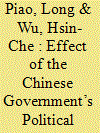| Srl | Item |
| 1 |
ID:
191594


|
|
|
|
|
| Summary/Abstract |
While China has been experiencing rapid economic growth, its conflicts with the United States have become more public. In particular, the argument that the Chinese government can easily gain public support in establishing and promoting national policies under its authoritarian regime has been on the rise. With this background, this study conducts an empirical analysis of data from 4,366 survey respondents using ordinary least squares and ordered logit models to analyze the effect of the Chinese government’s political propaganda and individual characteristics on anti-US sentiment. The results suggest that this propaganda strengthens anti-US sentiment. As for individual characteristics, party officials have stronger anti-US sentiment. Moreover, interacting exposure to political propaganda with the main variables suggests that members of the Communist Party of China, national minorities, and rural residents have stronger anti-US sentiment, presumably because they are more influenced by political propaganda.
|
|
|
|
|
|
|
|
|
|
|
|
|
|
|
|
| 2 |
ID:
127834


|
|
|
|
|
| Publication |
2013.
|
| Summary/Abstract |
How do global sources of information such as mass media outlets, state propaganda, NGOs, and national party leadership affect aggregate behavior? Prior work on this question has insufficiently considered the complex interaction between social network and mass media influences on individual behavior. By explicitly modeling this interaction, I show that social network structure conditions media's impact. Empirical studies of media effects that fail to consider this risk bias. Further, social network interactions can amplify media bias, leading to large swings in aggregate behavior made more severe when individuals can select into media matching their preferences. Countervailing media outlets and social elites with unified preferences can mitigate the effect of bias; however, media outlets promulgating antistatus quo bias have an advantage. Theoretical results such as these generate numerous testable hypotheses; I provide guidelines for deriving and testing hypotheses from the model and discuss several such hypotheses.
|
|
|
|
|
|
|
|
|
|
|
|
|
|
|
|